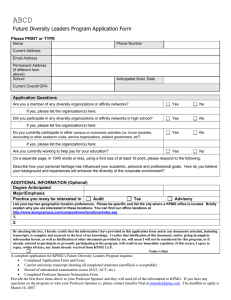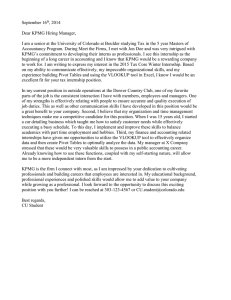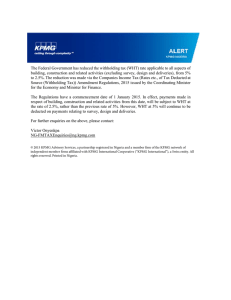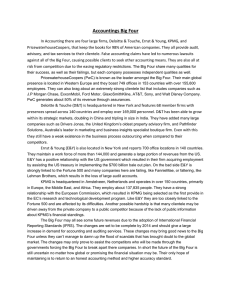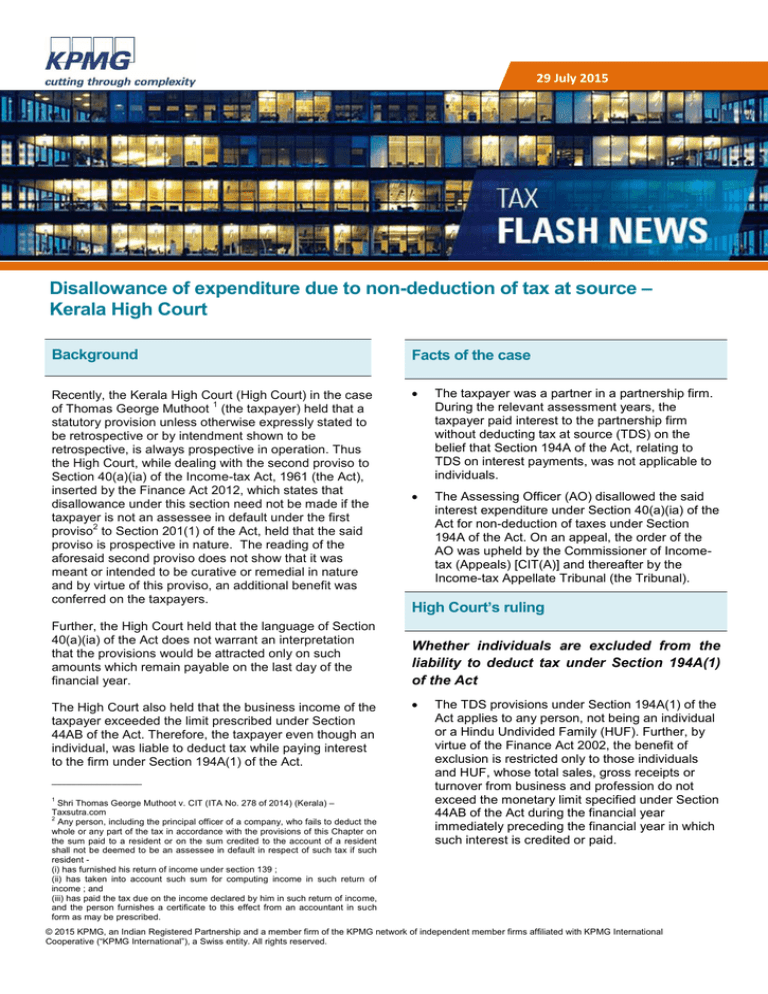
KPMG FLASH NEWS
KPMG in India
29 July 2015
Disallowance of expenditure due to non-deduction of tax at source –
Kerala High Court
Background
Facts of the case
Recently, the Kerala High Court (High Court) in the case
1
of Thomas George Muthoot (the taxpayer) held that a
statutory provision unless otherwise expressly stated to
be retrospective or by intendment shown to be
retrospective, is always prospective in operation. Thus
the High Court, while dealing with the second proviso to
Section 40(a)(ia) of the Income-tax Act, 1961 (the Act),
inserted by the Finance Act 2012, which states that
disallowance under this section need not be made if the
taxpayer is not an assessee in default under the first
2
proviso to Section 201(1) of the Act, held that the said
proviso is prospective in nature. The reading of the
aforesaid second proviso does not show that it was
meant or intended to be curative or remedial in nature
and by virtue of this proviso, an additional benefit was
conferred on the taxpayers.
The taxpayer was a partner in a partnership firm.
During the relevant assessment years, the
taxpayer paid interest to the partnership firm
without deducting tax at source (TDS) on the
belief that Section 194A of the Act, relating to
TDS on interest payments, was not applicable to
individuals.
The Assessing Officer (AO) disallowed the said
interest expenditure under Section 40(a)(ia) of the
Act for non-deduction of taxes under Section
194A of the Act. On an appeal, the order of the
AO was upheld by the Commissioner of Incometax (Appeals) [CIT(A)] and thereafter by the
Income-tax Appellate Tribunal (the Tribunal).
Further, the High Court held that the language of Section
40(a)(ia) of the Act does not warrant an interpretation
that the provisions would be attracted only on such
amounts which remain payable on the last day of the
financial year.
The High Court also held that the business income of the
taxpayer exceeded the limit prescribed under Section
44AB of the Act. Therefore, the taxpayer even though an
individual, was liable to deduct tax while paying interest
to the firm under Section 194A(1) of the Act.
__________________
1
Shri Thomas George Muthoot v. CIT (ITA No. 278 of 2014) (Kerala) –
Taxsutra.com
2
Any person, including the principal officer of a company, who fails to deduct the
whole or any part of the tax in accordance with the provisions of this Chapter on
the sum paid to a resident or on the sum credited to the account of a resident
shall not be deemed to be an assessee in default in respect of such tax if such
resident (i) has furnished his return of income under section 139 ;
(ii) has taken into account such sum for computing income in such return of
income ; and
(iii) has paid the tax due on the income declared by him in such return of income,
and the person furnishes a certificate to this effect from an accountant in such
form as may be prescribed.
High Court’s ruling
Whether individuals are excluded from the
liability to deduct tax under Section 194A(1)
of the Act
The TDS provisions under Section 194A(1) of the
Act applies to any person, not being an individual
or a Hindu Undivided Family (HUF). Further, by
virtue of the Finance Act 2002, the benefit of
exclusion is restricted only to those individuals
and HUF, whose total sales, gross receipts or
turnover from business and profession do not
exceed the monetary limit specified under Section
44AB of the Act during the financial year
immediately preceding the financial year in which
such interest is credited or paid.
© 2015 KPMG, an Indian Registered Partnership and a member firm of the KPMG network of independent member firms affiliated with KPMG International
Cooperative (“KPMG International”), a Swiss entity. All rights reserved.
In the light of the proviso to Section 194A(1), if the
taxpayers are claiming the exemption provided in
the Section, the burden is on them to establish
that they, being individuals, satisfied the
conditions specified in the proviso to the Section.
However, in the present case the taxpayer had
not produced any material to contradict specific
factual finding made by the Tribunal, wherein it
was held that the business income of the taxpayer
exceeded the limit prescribed under Section 44AB
of the Act and that the taxpayer even though an
individual, was liable to deduct tax while paying
interest to the firm under Section 194A(1) of the
Act.
Whether disallowance under Section 40(a)(ia)
of the Act can be made only in respect of
payments outstanding at the end of the year
The taxpayer, by placing reliance on the case of
5
Vector Shipping Services , contended that the
provisions of Section 40(a)(ia) of the Act are
applicable only in respect of the amount which
remain payable on the last day of the financial
year. Since the disputed interest amount in
question was not outstanding as at the year end,
the provisions of Section 40(a)(ia) of the Act are
not attracted.
The High Court held that the language of the
Section 40(a)(ia) of the Act does not warrant an
interpretation that it gets attracted only where the
interest remains payable on the last day of the
financial year. This view has been supported by
the decisions of the Calcutta High Court in the
6
case of Crescent Exports Syndicate and another
and the Gujarat High Court in the case of
7
Sikandadarkhan N Tunvar .
Accordingly, the High Court held that the
contention of the taxpayer that under Section
194A of the Act, an individual is excluded from the
liability to deduct tax and therefore disallowance is
without jurisdiction cannot be accepted.
Is the proviso to Section 40(a)(ia) of the Act
retrospective in nature
The other contention raised by the taxpayer was
that the second proviso to Section 40(a)(ia) of the
Act, which was inserted by the Finance Act 2012,
stating that disallowance under this section need
not be made if the taxpayer is not an assessee in
default under the first proviso to Section 201(1) of
the Act, is a remedial and curative clarificatory
proviso and hence applies retrospectively.
The High Court held that, a statutory provision
unless otherwise expressly stated to be
retrospective or by intendment shown to be
retrospective, is always prospective in operation.
In addition, it stated that the reading of the second
proviso does not show that it was meant or
intended to be curative or remedial in nature and
by virtue of this proviso, an additional benefit was
conferred on the taxpayers; hence such a
3
provision can only be prospective in nature .
Further, the taxpayer’s reliance on the Supreme
Court’s judgement in the case of Hindustan Coca
4
Cola was distinguished on the basis that the said
judgement was rendered in the context of Section
201(1) of the Act, the objective of which was
compensatory in nature and therefore, the ratio of
the said ruling cannot be applied to the provisions
of Section 40(a)(ia) of the Act.
In view of above, the High Court dismissed the appeal
of the taxpayer.
Our comments
The Kerala High Court in the present case held that a
statutory provision, unless otherwise expressly stated
to be retrospective or by intendment shown to be
retrospective, is always prospective in operation.
Therefore, the second proviso to Section 40(a)(ia) of
the Act shall apply prospectively.
The High Court held that the consequences under
Section 40(a)(ia) of the Act would operate on all
payments made without deduction of tax during the
year, whether or not the same are outstanding at the
end of the year. The said decision is in line with the
8
various High Court rulings . However, the Allahabad
High Court in the case of Vector Shipping Services
(P) Ltd ) had taken a contrary view and held that for
disallowance of expenditure on which tax has not
been deducted, the amount should be outstanding at
the end of the year.
Further it was held that the business income of the
taxpayer exceeded the limit prescribed under Section
44AB of the Act. Therefore, the taxpayer even though
an individual, was liable to deduct tax while paying
interest to the firm under Section 194A(1) of the Act.
_____________________________
5
CIT v. Vector Shipping Services (P) Ltd. (2013) 262 CTR 545 (Allahabad)
CIT v. Crescent Exports Syndicate and another [2013] 216 Taxman 258
(Cal)
7
CIT v. Sikandarkhan N. Tunvar [2013] 33 taxman.com 133 (Guj)
8
CIT v. Crescent Exports Syndicate and another [2013] 216 Taxman 258
(Cal), CIT v. Sikandarkhan Tunvar [2013] 33 taxman.com 133 (Guj), P.M.S.
Diesels v CIT [ITA No. No. 716 of 2009 (O&M), dated 29 April 2015] (P&H)
6
__________________________________
3
4
Prudential Logistics And Transports v. ITO [2014] 364 ITR 689 (Ker)
Hindustan Coca Cola Beverages Pvt. Ltd. v. CIT [2007] 293 ITR 226 (SC)
© 2015 KPMG, an Indian Registered Partnership and a member firm of the KPMG network of independent member firms affiliated with KPMG International
Cooperative (“KPMG International”), a Swiss entity. All rights reserved.
www.kpmg.com/in
Ahmedabad
Commerce House V, 9th Floor,
902 & 903, Near Vodafone House,
Corporate Road,
Prahlad Nagar,
Ahmedabad – 380 051
Tel: +91 79 4040 2200
Fax: +91 79 4040 2244
Bengaluru
Maruthi Info-Tech Centre
11-12/1, Inner Ring Road
Koramangala, Bangalore 560 071
Tel: +91 80 3980 6000
Fax: +91 80 3980 6999
Chandigarh
SCO 22-23 (Ist Floor)
Sector 8C, Madhya Marg
Chandigarh 160 009
Tel: +91 172 393 5777/781
Fax: +91 172 393 5780
Chennai
No.10, Mahatma Gandhi Road
Nungambakkam
Chennai 600 034
Tel: +91 44 3914 5000
Fax: +91 44 3914 5999
Delhi
Building No.10, 8th Floor
DLF Cyber City, Phase II
Gurgaon, Haryana 122 002
Tel: +91 124 307 4000
Fax: +91 124 254 9101
Mumbai
Lodha Excelus, Apollo Mills
N. M. Joshi Marg
Mahalaxmi, Mumbai 400 011
Tel: +91 22 3989 6000
Fax: +91 22 3983 6000
Hyderabad
8-2-618/2
Reliance Humsafar, 4th Floor
Road No.11, Banjara Hills
Hyderabad 500 034
Tel: +91 40 3046 5000
Fax: +91 40 3046 5299
Noida
6th Floor, Tower A
Advant Navis Business Park
Plot No. 07, Sector 142
Noida Express Way
Noida 201 305
Tel: +91 0120 386 8000
Fax: +91 0120 386 8999
Kochi
Syama Business Center
3rd Floor, NH By Pass Road,
Vytilla, Kochi – 682019
Tel: +91 484 302 7000
Fax: +91 484 302 7001
Pune
703, Godrej Castlemaine
Bund Garden
Pune 411 001
Tel: +91 20 3050 4000
Fax: +91 20 3050 4010
Kolkata
Unit No. 603 – 604,
6th Floor, Tower – 1,
Godrej Waterside,
Sector – V, Salt Lake,
Kolkata 700 091
Tel: +91 33 44034000
Fax: +91 33 44034199
The information contained herein is of a general nature and is not intended to address the circumstances of any particular individual or entity. Although we
endeavor to provide accurate and timely information, there can be no guarantee that such information is accurate as of the date it is received or that it will
continue to be accurate in the future. No one should act on such information without appropriate professional advice after a thorough examination of the
particular situation.
© 2015 KPMG, an Indian Registered Partnership and a member firm of the KPMG network of independent member firms affiliated with KPMG International
Cooperative (“KPMG International”), a Swiss entity. All rights reserved.
The KPMG name, logo and "cutting through complexity" are registered trademarks or trademarks of KPMG International Cooperative ("KPMG International").
This document is meant for e-communications only.
© 2015 KPMG, an Indian Registered Partnership and a member firm of the KPMG network of independent member firms affiliated with KPMG International
Cooperative (“KPMG International”), a Swiss entity. All rights reserved.

